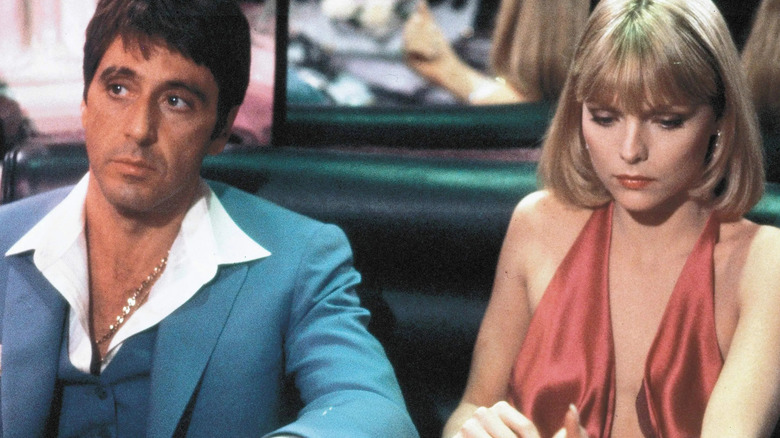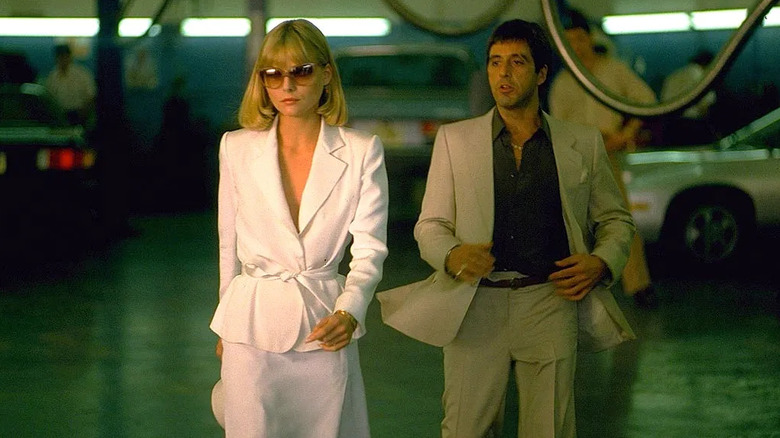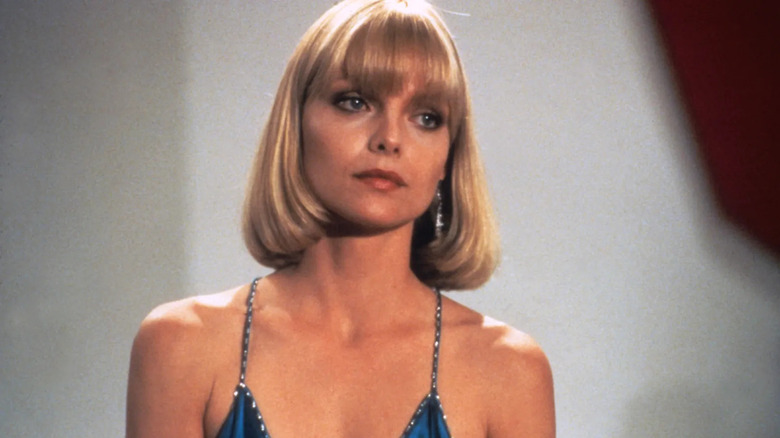Michelle Pfeiffer Proved Al Pacino Wrong With Her Scarface Performance
Al Pacino's boisterous performance as the ambitious, hotheaded, American Dream usurper Tony Montana is undoubtedly the heart of Brian De Palma's operatic gangster film "Scarface." But he tends to overshadow Michelle Pfeiffer's fine performance as Tony's wife, Elvira Hancock, an equally compelling character despite her limited screen time. Although they had chemistry, Pacino didn't initially want Pfeiffer to play the role.
"Look, my last credit before that was 'Grease 2,' can you blame him?" Pfeiffer quipped in a 2017 "Tonight Show" interview with Jimmy Fallon. The audition process for the role of Elvira was lengthy and intense, taking several months and involving different callbacks. At the time, Pfeiffer was a young aspiring actress overcome with nerves. She was surprised to be asked to do a screen test after previously being told she wasn't good for the part. She told Jimmy Fallon:
"I kind of drag myself, and I have, you know, just no feeling at all that I have any shot at getting this. So it kind of freed me up, you know, and sort of, I wasn't afraid."
Having no inhibitions allowed Pfeiffer to make creative choices in her audition with Al Pacino. She was completely in the moment during their feuding marriage scene, breaking dishes and throwing them around, causing one of the shards to cut Pacino's hand. Pfeiffer told Fallon she was horrified: "I saw the blood on the floor, I thought it was my blood, but no, I'd cut this big movie star!"
"Scarface" producer Martin Bregman and director De Palma thought she was "sensational" early in the audition process, but Pacino had reservations. "He was concerned that she didn't look right. She didn't fit the image of Elvira he had in his mind. But he was dead wrong," Bregman wrote in "Scarface Nation: The Ultimate Gangster Movie and How It Changed America." Apparently Pacino was picturing Glenn Close, who Bregman did not think fit the role. Pfeiffer certainly looks the part of a trophy wife, but she brings a lot of layers to the role.
Pfeiffer brings depth to an objectified role
In 2018, during a Q&A at the Tribeca Film Festival 35th anniversary screening of "Scarface," the moderator asked Michelle Pfeiffer, "As the father of a daughter, I am concerned with body image. In the preparation for this film, what did you weigh?" While Pfeiffer did lose weight for the role to portray Elvira's growing cocaine dependence, this crass inquiry is just another example of how female performances are constantly reduced to their looks. There is much more to Pfeiffer's performance than her slender body and perfectly manicured looks.
Pfeiffer portrays Elvira as an ice princess who armors herself with dry humor. Her apathetic exterior hides a wounded young woman trying to survive in a man's world. Elvira is a personification of Tony's American Dream — a blonde, thin dream doll to have on his arm. "She is a tiger. She'll belong to me," Tony declares, and he claims her just like the tiger he chains to his estate. Elvira is only valued for her appearance and the sense of power she gives men.
In "Scarface Nation," Pfeiffer reflects on playing a character confined by misogyny:
"Sometimes, though, by playing an object you can actually say more about objectifying women than if you play somebody of strength. She was a hood ornament, like another Rolls-Royce or something, for both of the men that she was with. I felt that by playing something that mirrors someone's life in that way, I could make a kind of feminist statement."
Channeling her own kind of power
Not all female characters have to be pillars of strength in order to be feminist. Elvira is not passive; she actively combats her objectification by openly joking about her drug lord boyfriend's assassination and standing up to Tony's prodding about her sex life. "I'm not your baby. Don't call me baby," she snaps at him. Elvira is not afraid to make the cocksure men around her feel small, exposing their chauvinism and penchant for aggressive violence as the playacting of little boys. But in Michelle Pfeiffer's wide and haunted eyes, she exquisitely conveys the hidden vulnerabilities beneath Elvira's aloof exterior.
Pfeiffer skillfully traces Elvira's devastating downward spiral. Increasingly dependent on cocaine and trapped in a miserable marriage, Elvira becomes a vacant-eyed, hollow shell of her former self. When she finally gains the strength to leave Tony, we can only hope she finds independence and does not become another object for a man to exploit. It's a credit to Pfeiffer's steely performance that the character of Elvira is not merely seen as eye candy, but someone with a depth of feeling.


